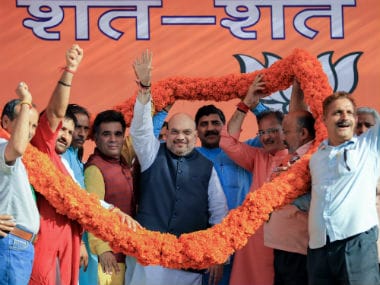Amit Shah's aggressive speech in Jammu brings back focus on J&K's special status and the politics around it
BJP president Amit Shah's aggressive speech in Jammu on Saturday brought the focus back on special powers for the state of Jammu and Kashmir. The most important of these is Article 35-A of the Indian Constitution.
Article 35-A basically reiterates the gist of Maharaja Hari Singh's 1927 proclamation, through which jobs and education could only be provided by the government of the state to 'state subjects' — those who could prove that their forebears lived in the state when Maharaja Gulab Singh, the founder of the Dogra dynasty, ruled.

Amit Shah in Jammu brought the focus back on J&K's special status. PTI
A challenge to the validity of the presidential order through which it was inserted into the Constitution, without reference to Parliament, is before the Supreme Court. The matter is expected to be taken up next on 16 August.
Presidential order
Article 35-A was inserted in 1954 under the provision of Article 370 (1)(d) of the Constitution, which allows the president to make “exceptions and modifications” to the Constitution for the benefit of 'state subjects' of Jammu and Kashmir.
Questions have been raised over whether 35-A is a 'modification' or a new provision, whether it should have been discussed by Parliament before the president issued the order, and whether Article 370 should remain at all.
Article 370 mandated that laws passed by Parliament, and portions of the Indian Constitution, would only apply to the state after the state's constituent assembly had approved them. Article 370 was specifically meant to be 'temporary', but remains on the statute sixty years after the constituent assembly's term ended in 1957, and the state constitution took effect on 26 January, 1958.


No comments:
Post a Comment